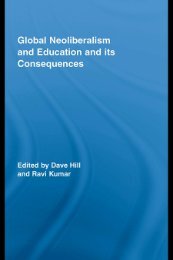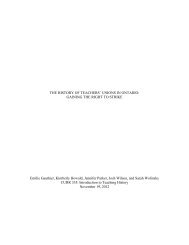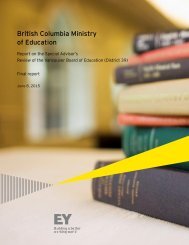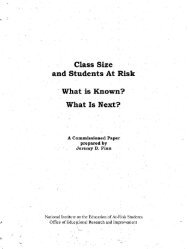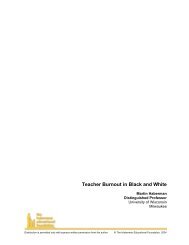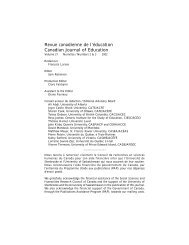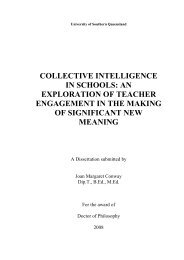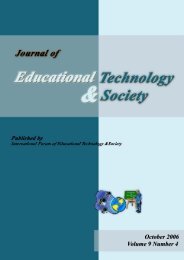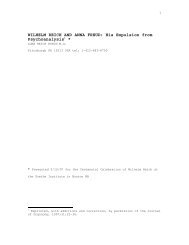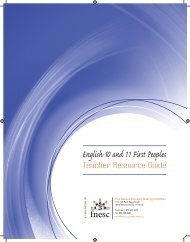Student Engagement: What do we know and what should we do?
Student Engagement: What do we know and what should we do?
Student Engagement: What do we know and what should we do?
Create successful ePaper yourself
Turn your PDF publications into a flip-book with our unique Google optimized e-Paper software.
to engage Net Geners may not be as effective or as critical as improving their<br />
information literacy <strong>and</strong> critical thinking skills (Barnes, Marateo, Ferris, 2007a,<br />
28).<br />
As mentioned previously, engagement <strong>do</strong>es not mean that core <strong>know</strong>ledge <strong>and</strong> traditional<br />
literacies (aka 3Rs) <strong>should</strong> be discarded; instead, students want to learn these in more<br />
engaging ways, while also learning how they learn. They want quality instruction<br />
delivered in socially, emotionally, <strong>and</strong> intellectually engaging ways. The Framework for<br />
21 st Century Learning created by Partnership for 21 st Century Learning sums up quite<br />
adequately a list of both the preferred outcomes <strong>and</strong> the key components of an engaging<br />
curriculum.<br />
“Framework for Century 21 Learning”<br />
Core Subjects <strong>and</strong> 21st Century Themes<br />
Mastery of core subjects <strong>and</strong> 21st century themes is essential to student success. Core subjects include<br />
English, reading or language arts, world languages, arts, mathematics, economics, science, geography, history,<br />
government <strong>and</strong> civics. In addition, schools must promote an underst<strong>and</strong>ing of academic content at much<br />
higher levels by <strong>we</strong>aving 21st century interdisciplinary themes into core subjects:<br />
• Global Awareness<br />
• Financial, Economic, Business <strong>and</strong> Entrepreneurial Literacy<br />
• Civic Literacy<br />
• Health Literacy<br />
• Environmental Literacy<br />
Learning <strong>and</strong> Innovation Skills<br />
Learning <strong>and</strong> innovation skills separate students prepared for increasingly complex life <strong>and</strong> work<br />
environments in today’s world <strong>and</strong> those who are not. They include:<br />
• Creativity <strong>and</strong> Innovation<br />
• Critical Thinking <strong>and</strong> Problem Solving<br />
• Communication <strong>and</strong> Collaboration<br />
Information, Media <strong>and</strong> Technology Skills<br />
Today, <strong>we</strong> live in a technology <strong>and</strong> media-driven environment, marked by access to an abundance of<br />
information, rapid changes in technology tools <strong>and</strong> the ability to collaborate <strong>and</strong> make individual<br />
contributions on an unprecedented scale. Effective citizens <strong>and</strong> workers must be able to exhibit a range of<br />
functional <strong>and</strong> critical thinking skills, such as:<br />
• Information Literacy<br />
• Media Literacy<br />
• ICT (Information, Communications <strong>and</strong> Technology) Literacy<br />
Life <strong>and</strong> Career Skills<br />
Today’s life <strong>and</strong> work environments require far more than thinking skills <strong>and</strong> content <strong>know</strong>ledge. The ability<br />
to navigate the complex life <strong>and</strong> work environments in the globally competitive information age requires<br />
students to pay rigorous attention to developing adequate life <strong>and</strong> career skills, such as:<br />
<strong>Student</strong> <strong>Engagement</strong>: <strong>What</strong> <strong>do</strong> <strong>we</strong> <strong>know</strong> <strong>and</strong> <strong>what</strong> <strong>should</strong> <strong>we</strong> <strong>do</strong>? 45



